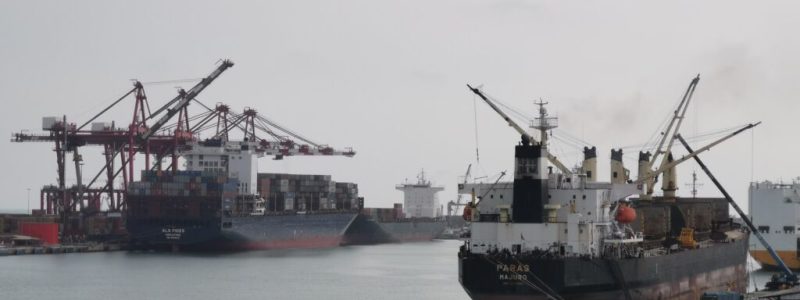PortuAIR
PortuAir is revolutionising air quality monitoring in ports with an innovative and connected approach. Thanks to smart sensors and real-time analysis, this solution provides a better understanding of the impact of port activities on the environment and public health. Discover how PortuAir is helping to create greener and more sustainable ports
Scope
The port of Cotonou is the primary seaport of Benin and key maritime gateway, serving as a vital hub for regional and international trade.
The Portu’AIR project stems from the adoption of the MARPOL Convention and the EcoPorts certification awarded to the Autonomous Port of Cotonou. These initiatives aim to monitor and prevent pollution associated with port activities.
With continuous modernization efforts, the port aims to increase its capacity and efficiency while ensuring operations are respectful of the environment.

Project Details
Company name: Port Autonome de Cotonou
Location: Cotonou (Benin)
Area: 79 km²
Year: 2023 until 2027
Partners : Enabel and Eco-Bénin
Project Overview
A data-driven, collaborative approach was taken to implement the air quality monitoring system at the Autonomous Port of Cotonou:
Clear Vision: Establishing a real-time monitoring system to improve environmental management and public health.
Strategic Partnership: Airscan, Enabel, Ecobenin, and the Port joined forces, providing technical, financial, and operational support.
Comprehensive Monitoring: 17 stations track key pollutants, while 7 rain gauges assess atmospheric deposition of PAHs and heavy metals.
Capacity Building: Port engineers were trained to analyze data, integrating operational and meteorological insights for policy development.
Ongoing Support: Airscan ensures system reliability through calibration, maintenance, and training.
This initiative equips the Port of Cotonou with a sustainable, science-based solution for air quality management.
Challenges
Adapting to Complex Environmental Conditions
Challenge: Harsh climatic conditions in the region posed difficulties for the long-term reliability and accuracy of monitoring equipment.
Solution: The network was equipped with cutting-edge, market-leading technology designed for durability and precision, ensuring consistent data collection despite environmental stressors.
Identifying Multiple Pollution Sources
Challenge: Pollution at the port stemmed from a variety of sources, making it difficult to identify key contributors.
Solution: Advanced analytics and source detection tools were used to trace pollution peaks to specific activities or locations, enabling more targeted interventions.
Building Local Capacity
Challenge: Ensuring that port staff could independently operate and interpret data from the monitoring platform required significant knowledge transfer.
Solution: A series of trainings and workshops were organized to empower port staff with the skills to analyse pollutant concentrations and effectively use the platform for informed decision-making.
Innovations
Advanced Air Quality Monitoring
Cutting-edge stations track key pollutants (PM1, PM2.5, PM10, NO₂, SO₂, CO, O₃), setting new standards for environmental stewardship.
Rainwater Pollution Tracking
Specialized gauges measure PAHs and heavy metals, identifying pollution sources for targeted action.
Integrated Data Platform
A digital platform combines real-time pollution, meteorological, and operational data for informed decision-making.
Capacity Building and Local Expertise
Ongoing training equips local engineers with the skills to analyze data and enhance environmental management.
Result
The comprehensive monitoring network has significantly increased awareness of air pollution sources and levels among port management, staff, and local stakeholders, facilitating proactive engagement with environmental issues.
Real-time pollutant and meteorological data have directly contributed to evidence-based policymaking, enabling targeted actions and rapid responses to pollution events, resulting in measurable improvements in local air quality.
Training sessions and workshops have substantially improved the analytical skills and technical proficiency of the local environmental team, promoting independence in environmental management and fostering long-term sustainability and effectiveness.
Through innovative monitoring practices and transparent environmental governance, the Autonomous Port of Cotonou has distinguished itself as a pioneering model of environmental responsibility and sustainability in the regional maritime sector, enhancing its reputation and influence.
